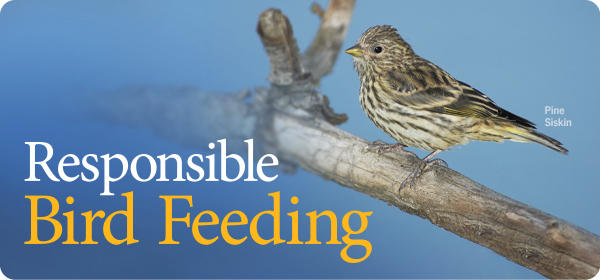Wild Birds Unlimited Recommends Responsible Bird Feeding

If you enjoy feeding and watching your backyard birds, then you probably want to do as much as you can to practice your hobby safely and ensure the birds’ overall health and well-being. While the cases of birds falling ill from feeders is usually small compared to other hazards birds face, during an irruptive season and a salmonella outbreak we are seeing more and more instances in the Pine Siskin population. Here are the things you can do to help all your birds stay healthy.
- Provide multiple feeding stations in different areas of your yard to disperse bird activity
- Provide seed from a WBU Eco-Clean Tube feeder rather than scattering it on the ground or using open trays where droppings can collect on bird food.
- Keep areas clean under and around your feeders.
- Keep fresh seed in the feeder and be sure it doesn’t get moldy. Feeding in smaller amounts ensures the birds fresher foods.
- Clean your bird feeders regularly with a solution of one part bleach and nine parts water.
The following strategies will help improve the health and safety of birds when the spread of avian diseases, such as the Salmonella we are seeing now, is a concern.
- Clean and sanitize all bird feeders, bird baths and hardware with a 10% bleach (one part bleach to nine parts water) solution. Rinse thoroughly and allow to completely dry before refilling feeders. Continue to sanitize feeders every few days. Clorox wipes are great to wipe down feeders and surfaces where birds congregate.
- Rake up and discard seed debris and bird droppings from the ground below and around feeders. Hose off the ground under the feeders weekly to disperse any collection of bird droppings. Continue to clean these areas on a regular basis.
- Give the birds more space. If using multiple feeders, place the feeders farther apart from one another. This will reduce crowding, lower stress and lessen the potential for disease transmission between sick and healthy birds.
- Only use feeders that can be easily cleaned. Replace wooden feeders with ones made of plastic or recycled materials for easier cleaning. Bird feeders with cracks and crevices are difficult to sanitize and should not be used.
- Remove open tray and platform feeders that allow fecal material and food to come into contact with each other.
- Use antimicrobial bird feeders such as Wild Birds Unlimited EcoClean® Feeders. These feeders have built-in antimicrobial product protection on the treated surfaces and quick release bottoms that make cleaning a snap.
If finch populations are involved - Pine Siskins are in the finch family and they will exhibit symptoms of Salmonella by being lethargic, puffed up, panting & not moving:
- Pause usage of your finch feeders. Reinstall finch feeders and food after a two week break.
- Provide foods and feeders that will not attract finches (suet, Bark Butter, peanuts, hummingbird feeders, etc.
- Remove all trays and tray feeders where droppings can accumulate.
- Clean and refresh the water in your birdbath daily.
- Limit the amount of seed you provide. Offer only as much food as the birds will eat in one or two days.
- Store all bird seed in rodent- and insect-proof containers to avoid contamination.
- Always discard any seed that has become wet, moldy or foul smelling.
- Avoid handling sick birds and always wash your hands with soap and water after filling bird feeders.
For other tips or questions, contact us to talk to one of our Certified Bird Feeding Specialists.

